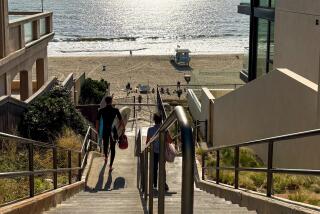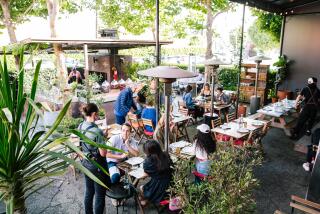Providing a Warm Welsh Welcome on a Windy Pembrokeshire Night
- Share via
ST. DAVID'S, Wales — It was, to quote Dylan Thomas, a night of “noisy sea . . . and wave and froth.” The ticket agent on the wharf at Fishguard, jovial despite a cold wind and driving rain, was doubtful that weather conditions in the Irish Sea would permit the overnight ferry to sail for Rosslare, Ireland.
“But even if it does,” he said, “you’d have a wild time of it. Why not spend a snug night ashore and try your luck on tomorrow’s daylight sailing at 3 in the afternoon?”
Could he recommend a place to stay, other than the unpromising commercial hotels fronting the harbor in Fishguard? He could indeed.
“If you’re of Irish descent, like myself,” he said, “you should try St. David’s near Whitesands Bay. It was there, you know, that St. Patrick first set sail for Ireland.”
For him whose mother’s maiden name was O’Farrell, there could be no other choice. We ran back to our car and found in our “AA Guide to Hotels and Restaurants in Britain” a three-star refuge from the storm. It was the Warpool Court Hotel, 18 miles southwest of Fishguard along Route A487. Built in the 1860s as the choir school for St. David’s Cathedral, according to our book, it was just a short walk from the town of St. David’s and had a sea view across seven acres of gardens.
Half an hour later we were there. The lobby was warm and cheerful, and we were looking forward to a candlelight dinner and a carafe of wine before an open fire. But it was not to be. “Sorry,” said the woman behind the desk, “we’re full up for the week. But let me ring other hotels for you.”
The first three or four calls were dry, and we felt the first tremor of panic at the prospect of having to return to Fishguard along a pitch-black, gale-swept road on this westernmost promontory of Wales.
But luck finally was with us. “There’s one room left at the Whitesands Bay Hotel,” she said, “and they will hold it for you.”
Although the Whitesands was just a short run from St. David’s, the desk clerk’s complex directions for reaching it were too much for our travel-weary brains. The manager came to our assistance and then the bellman, but the spate of sing-song Welsh advice was too much for us to grasp.
Finally, an old woman with a towel tied around her waist came out of the kitchen and saw our confusion. “Oh, come on then, follow me,” she said. After ducking back into the kitchen for her coat and hat, she led us to the parking lot and took off at high speed in an ancient Volkswagen.
After a tire-screeching eternity on the twisting, rain-slick country roads we saw a splash of light ahead. The woman hit the brakes in front of a small hotel standing alone on a bleak rise above the sea. After she ran inside for a man to help us with our bags, we tried to tip her a pound note, but she wouldn’t accept it.
“It was nothing at all,” she said. “You’re in Wales now.” And then, with a wave of her hand, “I must be back to my kitchen.”
The hotel could not have been more welcoming. A handsome German shepherd met us at the desk, his tail thumping furiously. We were taken upstairs by the owner to a large room with a double view--a golf links just below our window and the sea in the near distance.
After our harrowing day at least one Scotch was in order, and the Tall Ships Bar, its walls hung with prints of 19th-Century square-riggers, had just the right atmosphere for friendly encounters. Within minutes we were chatting with a couple from Oxford (“We’re here for the birds”) and a Royal Air Force veteran of the Battle of Britain who had spent the afternoon on the sodden fairways (“If you won’t play golf in Britain in this weather, you won’t play golf at all”).
The dining room was as congenial as the bar. The yellow tablecloths and chairs and the soft glow of candles were a comforting contrast to the storm raging outside. We had an excellent dinner of fresh salmon in puff pastry in a tarragon and white wine sauce, and a first-class house Chardonnay. After only one nightcap in the bar (and scorning “Dynasty” on the TV in the library) we fell into bed with the rain pelting our windows.
Incredibly, we awoke the next morning to bright sunshine and with hours to spend prowling this wild coastal section of Pembrokeshire before returning to Fishguard.
Our breakfast companions, the couple from Oxford, were laden with notebooks, binoculars, cameras and guides to the birdlife here. “This is a bird watcher’s Eden,” they told us. “Nowhere in Britain will you find as many exotic migratory birds, nor such an abundance of native species.”
The cliffs are a rookery for choughs and peregrine falcons, they said, and just 12 miles west was Grassholm Island, said to be one of the world’s largest gannetries.
Our new friends said the peninsula on which our hotel stood was part of Pembrokeshire Coast National Park, which occupies a third of the county. We could walk on public footpaths for more than 150 miles along the cliffs and beaches, which were teeming with wild birds and breeding seals.
But not this morning. We were willing to settle for a morning constitutional along the white sandy beach below the hotel.
Our host was waiting for us at the door and told us that Buster, the German shepherd, would show us the most direct trail to the beach. And Buster did, herding us past the swimming pool and sauna toward a steep path leading down. He would pause from time to time, waiting for us to catch up, and then frolic ahead to another turning of the path.
Only when we were on the beach did he abandon us briefly to renew his acquaintance with other dogs. But when he saw us turn back toward the trail to the hotel, Buster swiftly took up his leadership position and saw us safely home.
We were reluctant to check out early in the forenoon from the Whitesands. We would have spent at least a day or two longer if it had not been for hotel reservations in Ireland. But we were also looking forward to the chance to explore St. David’s.
After parting company with a reproachful Buster, we first drove through a rock-strewn landscape where cattle were grazing to a barren bluff overlooking the bay. There we found the plaque that marks the ancient location of St. Patrick’s Chapel, said to be the point of his departure for Ireland in the 5th Century.
But it is St. David, the patron saint of Wales, who commands greater attention in this bailiwick. The “city” of St. David’s, with a population of only 2,000, is the smallest in Britain to merit designation as a metropolitan center, and that only because of the presence of St. David’s Cathedral, whose earliest sections date from 1180. The saint’s bones rest in a casket behind the high altar.
The venerable structure and its square tower are surprisingly austere and do not dominate the countryside as is often the case with European cathedrals. It sits in an enormous hollow, and visitors must descend 39 steps (known as the Thirty-Nine Articles) to reach the entrance.
But the Welsh claim the site as “the holiest ground in all of Britain,” and quote an early Pope as decreeing that two pilgrimages to St. David’s were equal to one to Rome.
Not far from the town are the ruins of the Chapel of St. Non, mother of St. David, who is said to have been born on the site.
Frequent evening recitals take place in the cathedral, but the highlight of the year is the annual Bach Festival, held during the last week of May or first week of June.
We had an excellent lunch at the Warpool Court Hotel and a leisurely walk through the town. Fine Welsh woolens, made in local mills, were the best bargains in the shops.
That afternoon, looking back from the ferry to St. George’s Head, we treasured the thought of this remote section of Wales, and decided to return another time to our bright discovery on a gloomy night.
(Since our stay a new family ownership--John and Linda Baxter and their sons, Dean and Russell--have taken over the Whitesands Bay Hotel. John Baxter has written to us that “Dean is in charge of the wet trade” and that Russell is the chef. The menu remains much the same--lamb, game, seafoods and locally bred venison. The wine list is extensive and affordable. But Baxter was also the bearer of sad tidings; Buster lost his life under the wheels of a lorry last year.)
Whitesands Bay Hotel, St. David’s, Pembrokeshire, Dyfed, SA62 6PT Wales. From July 1 to Sept. 1, bed and breakfast $42 per person; Sept. 2 to June 30, $36 per person. There are discounts for stays longer than one night, and substantially lower rates for children. Dinners are $18. There are no greens fees on the nine-hole (18-tee) golf course for guests of the hotel.
There are other hotels in and near St. David’s, including the Warpool Court Hotel. Prices for bed and breakfast are mostly in the moderate range.
For more information on travel to Great Britain, contact the British Tourist Authority, 350 S. Figueroa St., Suite 450, Los Angeles 90071, (213) 628-3525.
More to Read
Sign up for The Wild
We’ll help you find the best places to hike, bike and run, as well as the perfect silent spots for meditation and yoga.
You may occasionally receive promotional content from the Los Angeles Times.






